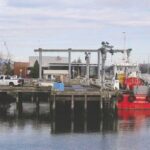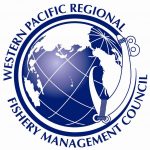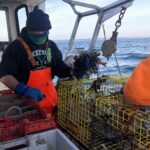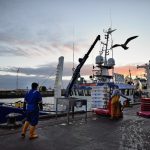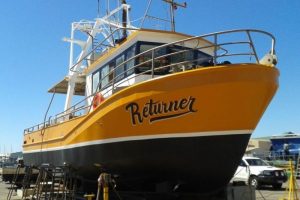Tag Archives: whale entanglement
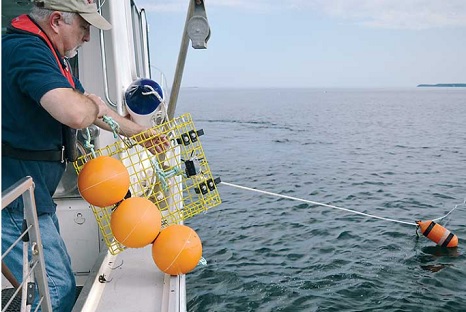
Crackpottery? A Ropeless Future for Lobster Fishing, they say!
The object thrown overboard was not in fact a trap but a ropeless fishing system deployed in a demonstration for passengers on the boat, including a film crew, a reporter and three people who study or advocate for right whales. Zack Klyver chartered the boat and arranged the demonstration. Through his consultancy, Blue Planet Strategy, he has been working as an intermediary between manufacturers, whale advocates and lobstermen, who find themselves on various sides of a regulatory survival equation as the federal government moves to protect endangered right whales. In ropeless fishing, Klyver sees a potential win for everyone involved, but getting there may take time and a fair amount of persuasion. Some funky photos, >click to read< 17:40
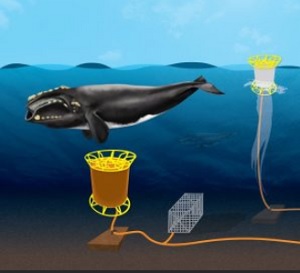
Fed Right whale plan could mean lobster industry changes – a reinvention of the fishery as we know it
Federal officials recently released plans,,, But it’s the risk reduction target, an aggressive 98 percent, that Maine Department of Marine Resources officials said means only one thing, “a complete reinvention of the fishery as we know it.” The conservation framework, an addition to the 582-page biological opinion, creates a four-phased approach to all but eliminate the death and serious injury of the whales in federally managed fishing grounds. The first phase calls for a 60 percent reduction in right whale deaths and serious injuries this year. Patrice McCarron, Maine Lobstermen’s Association, fears the industry can’t sustain that level of change. “If you look at the changes we’ve made over the last 25 years, there’s not a lot left to give,”, >click to read< 10:27

Richard “Max” Strahan attempted to intervene in right whale case with court injunction
An animal rights activist made a late attempt to try and stop the industry from being allowed to use vertical buoy ropes. Richard “Max” Strahan tried to intervene at the beginning of the month in the federal right whale court case that holds the future of the lobster industry in its hands, but the activist’s attempt was rejected by a judge less than a week later. Strahan filed his motion on May 8 and claimed that the only way the industry would stop using the ropes is by a court-ordered injunction. >click to read< 16:03
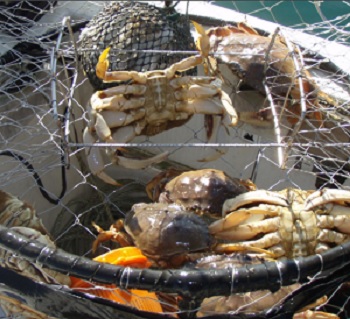
California Crab Groups Oppose Legislation Requiring ‘Ropeless’ Gear
The crabbing season has been repeatedly delayed by state agencies citing concerns about whale sightings,,, The most recent industry challenge comes in the form of proposed legislation which would require crabbers and many other fishermen to use “ropeless” traps by the end of 2025 in order to avoid killing or harming sea creatures which can become snared in lines stretching from a trap at the sea-floor to a buoy at the surface. In a recent press release, Ben Platt, president of the California Coast Crab Association, an industry group formed last year, says AB 534 “promotes an unproven and unviable fishing method that presents significant operational and safety risks to West Coast fisheries.” >click to read< 08:13
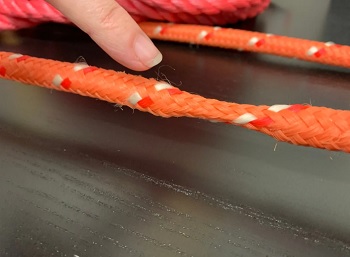
P.E.I. lobster fishermen want exemption from new gear rule aimed at protecting whales
Island lobster fishermen should be be exempt from using gear designed to break free in the event of a whale entanglement, according to the P.E.I. Fishermen’s Association (PEIFA). The PEIFA wrote a letter to the Department of Fisheries and Oceans (DFO) to request lobster fishermen be exempt from new rules, which are expected to become mandatory by the end of 2022. The group says sighting data shows the endangered North Atlantic right whale is rarely in P.E.I. lobster fishing grounds. >click to read< 10:46

This Year’s Dungeness Crab Fishery a Shell of its Former Self
New regulations and price strikes delayed the start of the season. Dungeness crab fishermen face the worst catch numbers in decades. CDFW monitors for whales, and sea turtles and can delay or halt Dungeness crab commercial fishing if they determine that the risk of entanglement is high. That happened twice at the beginning of this season. The presence of humpback whales kept the fishermen out of the water from the originally scheduled start date of Nov. 15 until Dec. 23. Some fishermen, like Ben Platt, president of the California Coast Crab Association, worry that the new regulations will squeeze the season into a few months every year. Half Moon Bay-based fisherman Tim Obert agrees. “The Thanksgiving market’s huge for us,” he says. “The RAMP has taken that out.” >click to read< 21:10

California Dungeness Crab season opens Dec. 23
The official opening date of Nov. 15 had been delayed for weeks in the central California zone, from the Sonoma/Mendocino county line south, because of the possibility of migrating whales getting tangled in fishing lines. And it had been delayed in the northern zone, which consists of Humboldt, Mendocino and Del Norte counties, because the sample catch failed to reach the poundage required for testing.,, Since 2015, there have been delays in all but one commercial Dungeness season. A toxin, domoic acid, that could sicken anyone who eats the tainted crab destroyed Northern California’s 2015-2016 commercial season and created delays in other years. >click to read< 09:52
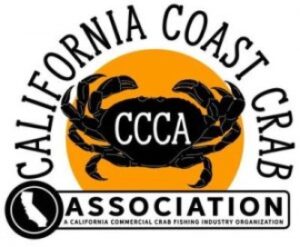
Punitive New Rules Will Crush CA Dungeness Crab Fishing Families, Threaten Holiday Crab Traditions
This week, the California Department of Fish and Wildlife (CDFW) put into effect onerous new regulations that among other things, could delay or close the state’s iconic crab fishery if whales are present near the crab grounds and could economically devastate our coastal communities that rely on the fishing and seafood industry. Called the Risk Assessment Mitigation Program (RAMP), these punitive rules also include triggers for crab fishery closures that are more restrictive than even the strictest fishery laws in the nation, the Marine Life Protection Act (MLPA) and the Endangered Species Act (ESA). “Regulators seem to be more concerned about the optics in the media of the rare occurrence of an entangled whale than the fact that the populations of these marine mammals, which migrate off our coast, are skyrocketing, and may soon be eligible for removal from the Endangered Species List,” said Ben Platt, president of the California Coast Crab Association (CCCA). >click to read< 10:02
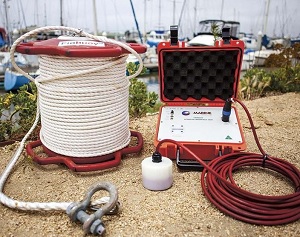
Ropeless gear is not the silver bullet – New technology promises to save the whales by reducing the need for crab fishing lines.
“We are working with fishermen to see what works and what doesn’t and what allows the fisherman to survive economically,” says Geoff Shester, a Monterey-based scientist with nonprofit Ocean. In June, the Ocean Protection Council awarded $500,000 for the testing of pop-up gear in the coming fishing season. The money will pay for five prototypes, including designs by Marina-based Desert Star Systems and Watsonville-based McFarlane Marine Services. The money will also go to fishermen participating in the research. A new crab industry group, California Coast Crab Association, is pushing back. Its president, Ben Platt, described the RAMP regulations as “an existential threat to our livelihoods”,,, >click to read< 08:39
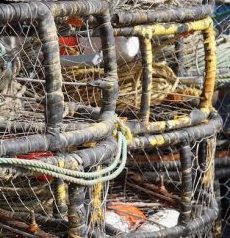
California plans to protect whales from crab traps rankle all sides – one thing was clear, no one’s happy.
Stakeholders on both sides of the aisle had complaints — environmentalists don’t think the protections go far enough, while industry groups say the regulations threaten the economic viability of the crab fishing industry. Set to take effect Nov. 1, the California Department of Fish and Wildlife’s Risk Assessment Mitigation Program (RAMP) will serve as the primary mechanism for mitigating entanglement risk to humpback and blue whales and leatherback sea turtles whose populations are endangered and could suffer additional casualties due to getting caught in Dungeness crab fishing gear. The regulation would replace the interim authority given to the director of the Department of Fish and Wildlife,, >click to read< 09:13
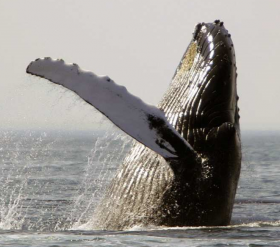
Crab Command and Control – California Dungeness Crab Fishing Gear Working Group
“Whales getting entangled in fishing gear is a huge crisis,” says John Mellor, a commercial fisherman and a member of the working group since its inception. “It has to be dealt with, and dealt with in real time.” Once or twice a month during Dungeness crab fishing season, which normally runs from November 15 to July 15, scientists in the working group conduct a series of mini research projects looking at four risk factors for entanglements: how many whales and sea turtles are around, where whales are likely to forage, the number and locations of recorded entanglements, and information about fishermen, including their landing data, license numbers, and the locations of their traps. >cxlick to read< 08:35
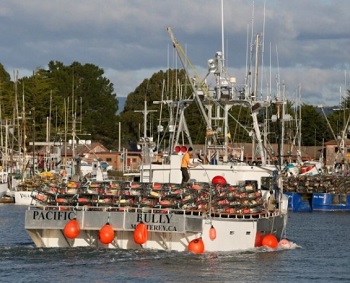
Crab fishing industry not canceled yet, but,,,
Humboldt County’s crab fishing season will remain open for now, unlike fisheries south of the Sonoma and Mendocino counties line, which have been ordered to close on May 15. An ongoing settlement agreement allows the season to be ordered closed when there’s too high a risk of whales becoming entangled in fishing gear. For now, the North Coast has been spared of closure, though a recent report from the National Oceanic and Atmospheric Administration flags one humpback whale, which beached at Samoa in October 2019. The whale later died. Overall, the report indicates California had 17 whale entanglements in 2019, down from 34 the year before. >click to read< 21:46
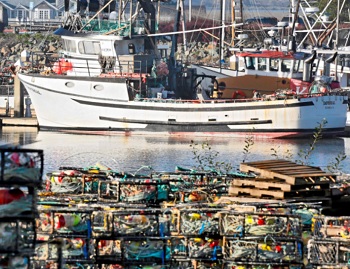
Crab season continues as whale entanglement risk remains low
From a California Department of Fish and Wildlife release: The California Department of Fish and Wildlife (CDFW) is providing the following important update on the status of the commercial California Dungeness crab fishery which includes the Northern Management Area (Fish and Game Districts 6, 7, 8 and 9) and Central Management Area (Fish and Game Districts 10 and south). more, >click to read< 09:42
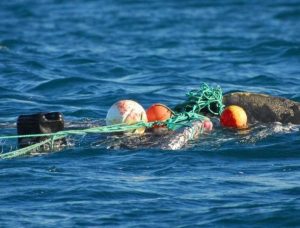
Whale entanglements in NSW waters hits new record
Marine Wildlife Project Officer with NSW National Parks and Wildlife Service, Andrew Marshall, said between May and September there were 35 reported whale entanglements off the NSW coast and only a handful of successful rescues.,,, Mr Marshall said it was a common misconception that whales were mainly getting tangled in shark nets or marine debris. “That just doesn’t stack up with our data; in the vast majority of cases, it’s not debris and less than 10 per cent is nets,” he said. Mr Marshall said it was fantastic to see humpback whale numbers recovering and booming, but that also meant there would be an increasing number becoming entangled. >click to read< 10:52
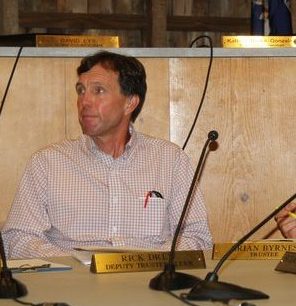
East Hampton Trustee Calls On State To Control Gillnets Better After Whale Entanglement
After a summer in which fishing nets anchored just off South Fork beaches ensnared swimmers and a seal and a humpback whale, East Hampton Town Trustee Rick Drew is calling for an overhaul of the regulations on gill net fishing off Long Island. The Trustee and avid fisherman said that he believes there need to be new restraints that dictate where gill nets can be set, and how long they can be left unattended, as well as better enforcement of the rules by the State Department of Environmental Conservation. >click to read< 11:06
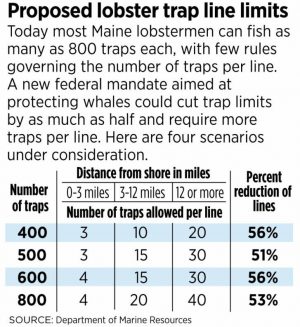
New rules are meant to save whales; lobstermen wonder if they’ll survive
The state Department of Marine Resources has until September to come up with a way that it can cut the number of buoy lines in the Gulf of Maine by 50 percent. Federal regulators say that’s what it will take to reduce the risk of fatal entanglement enough for the species to survive. Scientists estimate only 411 right whales remain. The species has been on the brink of extinction before, most recently in 1992, when its population bottomed out at 295. It rebounded to about 500 in 2010, but low calving rates, ship strikes and fishing line entanglements have sent its numbers tumbling, yet again. But many in Maine’s $485 million industry worry it is the lobsterman who will face extinction,,, >click to read<10:28
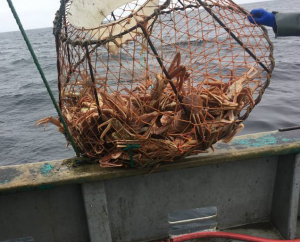
New Brunswick fishermen get $2M to test gear to prevent whale entanglements
Snow crab fishermen in northern New Brunswick are getting more than $2 million over three years to help test technologies aimed at reducing the risks of North Atlantic right whale entanglements in fishing gear.The funding for the Acadian Crabbers Association comes through the $400-million Atlantic Fisheries Fund, which is jointly funded by Ottawa and the region’s provincial governments. >click to read<17:08
Washington Crabbers Join Peers In Tackling Whale Entanglement Risk
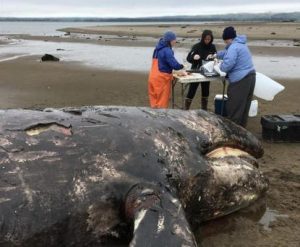 Earlier this year, a gray whale calf died after getting tangled in crab pot lines near Seaview, Washington. Now commercial and tribal crab fishermen from the Washington coast have agreed to form a working group to discuss how to reduce the risk of a repeat. Fleets in Oregon and California have previously formed similar work groups. Whale numbers along the West Coast are rebounding, but so are sightings of humpback whales, gray whales and the odd blue whale entangled in fishing lines and buoys. click here to read the story 08:55
Earlier this year, a gray whale calf died after getting tangled in crab pot lines near Seaview, Washington. Now commercial and tribal crab fishermen from the Washington coast have agreed to form a working group to discuss how to reduce the risk of a repeat. Fleets in Oregon and California have previously formed similar work groups. Whale numbers along the West Coast are rebounding, but so are sightings of humpback whales, gray whales and the odd blue whale entangled in fishing lines and buoys. click here to read the story 08:55
Whale Protection Bill SB 1287 – North Coast Senator speaks on progress
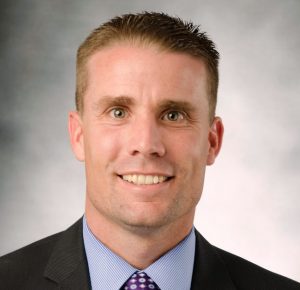 North Coast Senator Mike McGuire’s Whale Protection Bill has passed, and now involved agencies are working on implementation. Senate Bill 1287 aims to help stop whale entanglements by crab and fishing gear up and down the California coast. Governor Brown signed it into law in September of last year, which saw a record breaking number of entangled whales, with 66 off the California coast alone. The senator hopes the bill will be fully implemented by mid-2018. It will require crabbers to be responsible for collecting their gear, or else they could face losing their commercial fishing license. click here to read the story 11:25
North Coast Senator Mike McGuire’s Whale Protection Bill has passed, and now involved agencies are working on implementation. Senate Bill 1287 aims to help stop whale entanglements by crab and fishing gear up and down the California coast. Governor Brown signed it into law in September of last year, which saw a record breaking number of entangled whales, with 66 off the California coast alone. The senator hopes the bill will be fully implemented by mid-2018. It will require crabbers to be responsible for collecting their gear, or else they could face losing their commercial fishing license. click here to read the story 11:25
Fishing regulators consider ways to avoid whale entanglement
As early as this week, federal fisheries regulators are expected to propose a new rule so North Atlantic right whales, humpbacks and fin whales will be less likely to get entangled in vertical fishing lines. continued@capecodtimes![]()

































